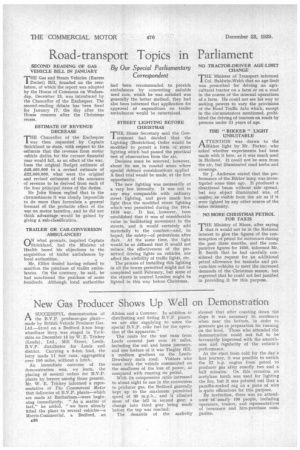Road-transport Topics in Parliament
Page 32

If you've noticed an error in this article please click here to report it so we can fix it.
By Our Special Parliamentary Correspondent
SECOND READING OF GAS VEHICLE BILL IN JANUARY
TbiLGas and Steam Vehicles (Excess es) Bill, founded on the resolution, of which the report was adopted by the House of Commons on Wednesday, December 13, was introduced by the Chancellor of the Exchequer. The second-reading debate has been fixed for January 17, the day after the House resumes after the Christmas recess.
ESTIMATE OF REVENUE DECREASE
THE Chancellor of the Exchequer was then requested by Captain Strickland to state, with respect to the estimate that the revenue from motor vehicle duties for the current financial year would fall, as an effect of the war, from the original Budget estimate of £43,450,000 to a revised estimate of £22,000,000, what were the original and revised estimates of the amounts of revenue to be derived from each of the four principal items of the duties.
Sir John Simon replied that in the circumstances it was clearly impossible to do more than formulate a general forecast of the probable effect of the war on motor taxation, and he did not think advantage would be gained by giving a sub-classification.
TRAILER OR CAR-CONVERSION AMBULANCES?
nN what grounds, inquired Captain L./Strickland, had the Minister of Health based his objections to the acquisition of trailer ambulances by local authorities.
Mr. Elliot denied having refused to sanction the purchase of trailer ambulances. On the contrary, he said, he had sanctioned the purchase of some hundreds. Although local authorities
had been recommended to provide ambulances by converting suitable used ears, which he was satisfied was generally the better method, they had also been informed that application for approval of expenditure on trailer ambulances would be entertained.
STREET LIGHTING BEFORE CHRISTMAS
THE Home Secretary said the Government had decided that the Lighting (Restriction) Order would be modified to permit a form of street lighting which had passed the practical test of observation from the air.
Decision must be reserved, however, about its use in coastal areas where special defence considerations applied A final trial would be made, at the first opportunity.
The new lighting was necessarily of a very low intensity. It was not in any way comparable with ordinary street lighting, and gave much less light than the modified street lighting which was permitted during the 19141918 war. It has, , however, been established that it was of considerable value in facilitating movement in the streets, and it would certainly add materially to the comfort-7-and, he hoped, the safety—of pedestrians after dark. At the same time, the light would be so diffused that it would not reduce the effectiveness of the permitted driving lights on vehicles, nor affect the visibility of traffic lights, etc.
The process of installing this lighting in all the towns permitted might not be completed until February, but some of the streeti in central London might be lighted in this way before Christmas. NO TRACTOR-DRIVER AGE-LIMIT CHANGE
THE Minister of Transport informed 1 Col. Baldwin-Webb that no age limit was prescribed for driving an agricultural tractor on a farm or on a road in the course of the internal operations of a farm. He could not see his way to seeking powers to vary the provisions of the Road Traffic Acts which, except in the circumstances mentioned, prohibited the driving of tractors on roads by persons under 21 years of age.
THE " BIKKER " LIGHT UNSUITABLE
ATTENTION was drawn to the Bikker light by Mr. Parker, who asked whether experiments had been made with it here, as it was much used in Holland. It could not be seen from the air, but illuminated road kerbs and crossings.
Sir j. Anderson stated that the performance of the Bikker lamp was investigated some time ago. It produced a directional beam without side spread, but any object illuminated was, of course, as visible from the air as if it were lighted by any other source of the same intensity.
NO MORE CHRISTMAS PETROL FOR TAXIS
THE Ministry of Mines, after saying that it would not be in the National interest to give the figures of the consumption of petrol for motorcars during the past three months, and the comparative figures for 1938, informed Mr. B. Smith that he had carefully considered the request for an additional petrol allowance for taxicabs and private-hire vehicles to meet the increased demands of the Christmas season, but regretted that he could not feel justified in providing it for this purpose.




















































